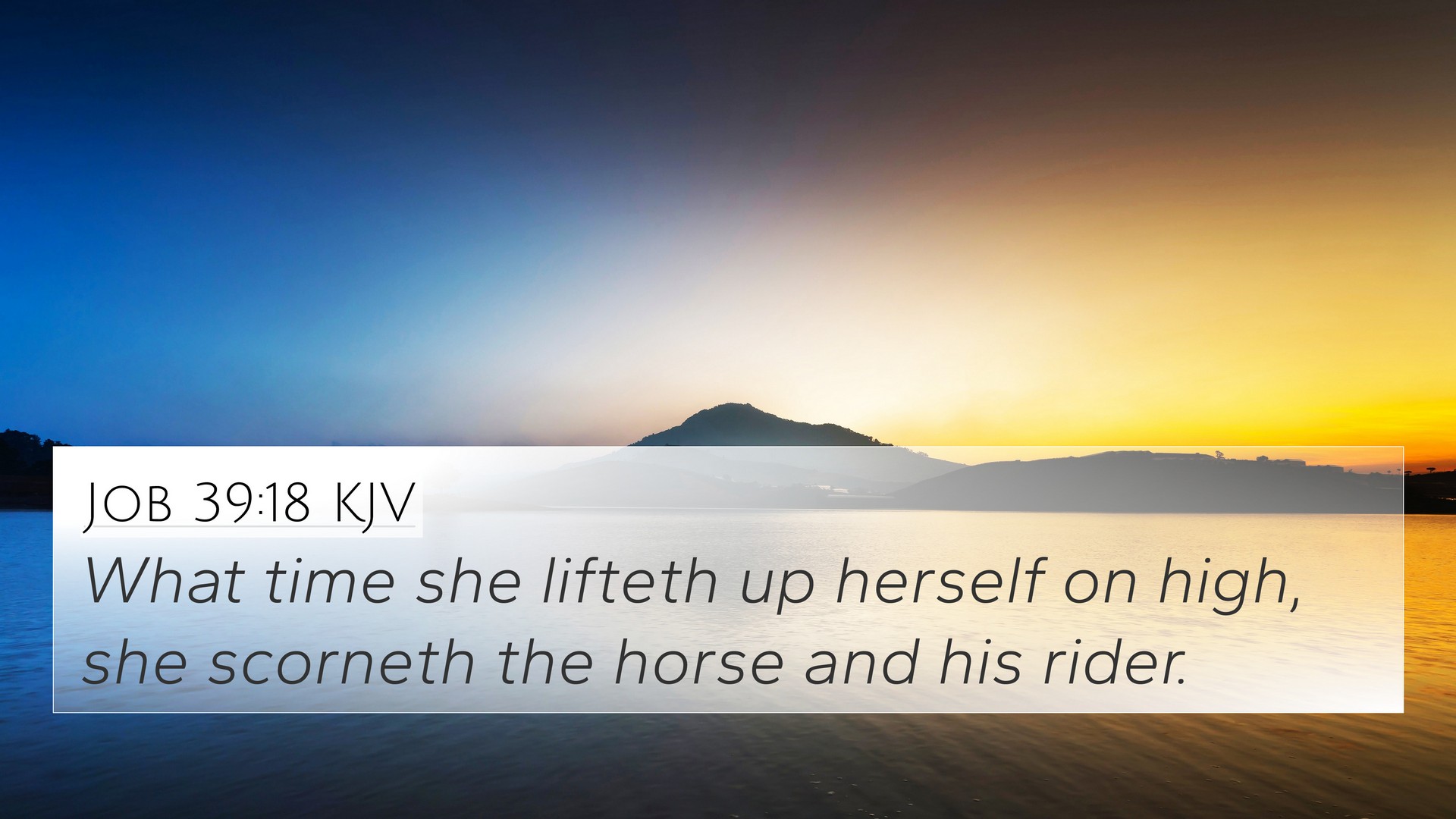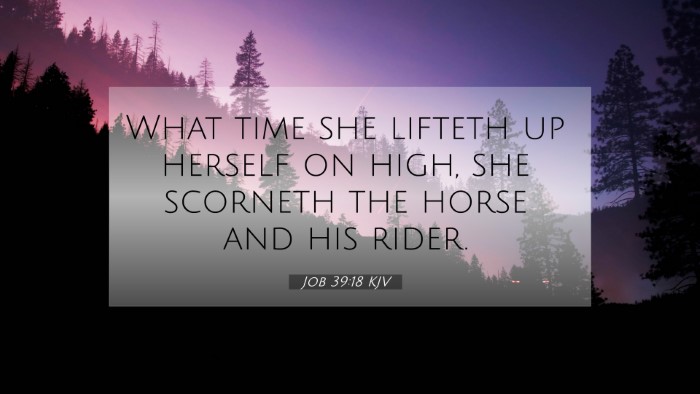Old Testament
Genesis Exodus Leviticus Numbers Deuteronomy Joshua Judges Ruth 1 Samuel 2 Samuel 1 Kings 2 Kings 1 Chronicles 2 Chronicles Ezra Nehemiah Esther Job Psalms Proverbs Ecclesiastes Song of Solomon Isaiah Jeremiah Lamentations Ezekiel Daniel Hosea Joel Amos Obadiah Jonah Micah Nahum Habakkuk Zephaniah Haggai Zechariah MalachiJob 39:18 Similar Verses
Job 39:18 Cross References
What time she lifteth up herself on high, she scorneth the horse and his rider.
Uncover the Rich Themes and Topics of This Bible Verse
Listed below are the Bible themes associated with Job 39:18. We invite you to explore each theme to gain deeper insights into the Scriptures.
Job 39:18 Cross Reference Verses
This section features a detailed cross-reference designed to enrich your understanding of the Scriptures. Below, you will find carefully selected verses that echo the themes and teachings related to Job 39:18 KJV. Click on any image to explore detailed analyses of related Bible verses and uncover deeper theological insights.
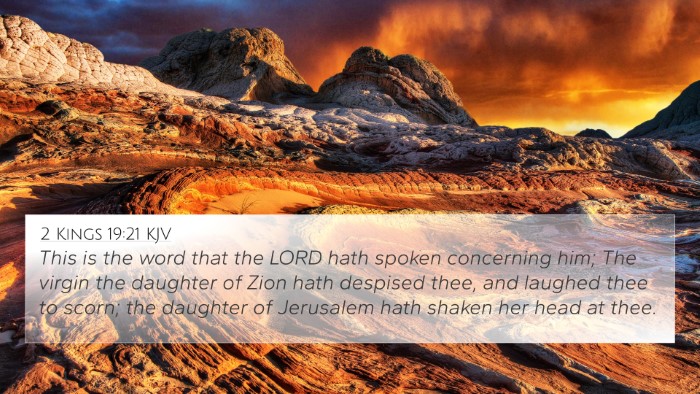
2 Kings 19:21 (KJV) »
This is the word that the LORD hath spoken concerning him; The virgin the daughter of Zion hath despised thee, and laughed thee to scorn; the daughter of Jerusalem hath shaken her head at thee.
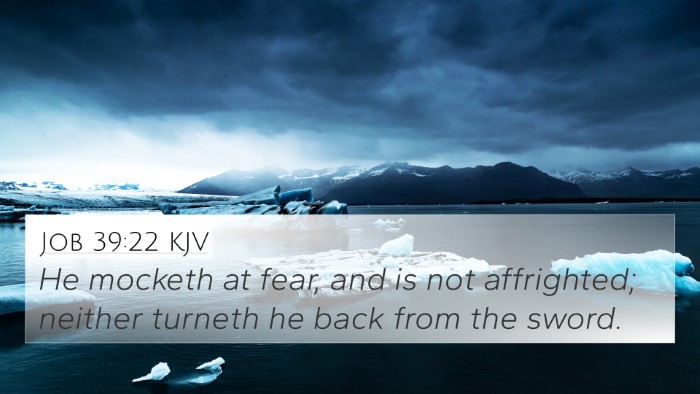
Job 39:22 (KJV) »
He mocketh at fear, and is not affrighted; neither turneth he back from the sword.
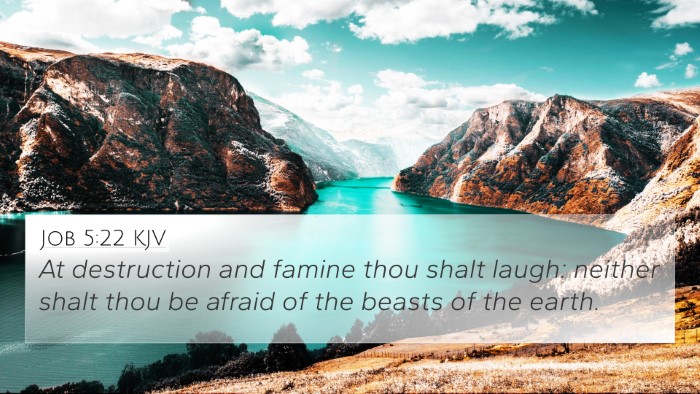
Job 5:22 (KJV) »
At destruction and famine thou shalt laugh: neither shalt thou be afraid of the beasts of the earth.
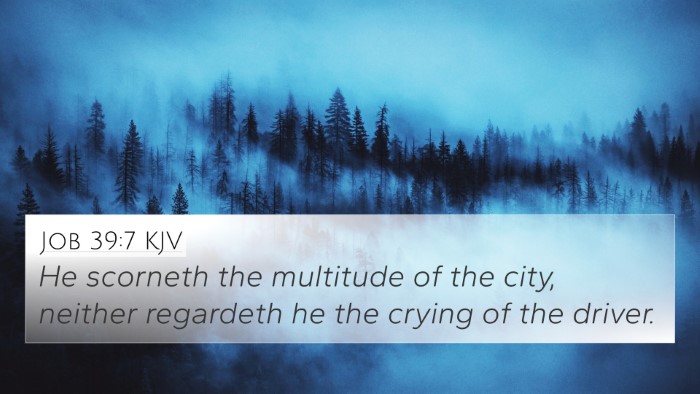
Job 39:7 (KJV) »
He scorneth the multitude of the city, neither regardeth he the crying of the driver.
Job 39:18 Verse Analysis and Similar Verses
Interpretation of Job 39:18
Job 39:18 states: "What time she lifteth up herself on high, she scorneth the horse and his rider." This verse marks a profound moment in the discourse between God and Job, illuminating both the majesty of creation and the humbling realization of human limitations.
Contextual Meaning
In the broader context of Job, this verse occurs during God's monologue where He speaks to Job about the wonders of creation. The focus in verse 18 is on the strength and indomitable spirit of the ostrich, a creature created by God, which serves as a symbol of freedom and strength that humans cannot attain.
Key Insights from Commentaries:
- Matthew Henry: Henry emphasizes the contrast between the ostentation of the ostrich and the vulnerabilities of its surroundings. The ostrich, in its prideful elevation, represents a carefree existence, seemingly unconcerned about the dangers of hunters or chariots.
- Albert Barnes: Barnes points out that the "lifting up" denotes both physical height and a sense of confidence. He notes that this verse illustrates a larger truth about the perception of power and might in the natural world — the bird's disregard of threats encapsulates a broader theme of divine strength over earthly concerns.
- Adam Clarke: Clarke elaborates on the ostrich’s unique characteristics, noting that although it is strong and swift, it is still foolish and easily led astray. This duality serves as a metaphor for humanity, often having strength yet lacking wisdom.
Theological Implications
The imagery in this verse challenges the reader to reflect on themes of pride and self-sufficiency. The ostentatious freedom of the ostrich invokes a deeper awareness of the folly in relying solely on oneself, suggesting a need for humility and faith in God’s design.
Bible Cross-References
The verse Job 39:18 can be cross-referenced with other Scriptural passages that echo similar themes of strength, folly, and divine power:
- Proverbs 16:18: "Pride goes before destruction, and a haughty spirit before a fall."
- Psalms 147:10-11: "His delight is not in the strength of the horse, nor his pleasure in the legs of a man. The LORD takes pleasure in those who fear him, in those who hope in his steadfast love."
- Isaiah 40:30-31: "Even youth shall faint and be weary, and young men shall fall exhausted; but they who wait for the LORD shall renew their strength."
- Job 39:17: "Because God hath deprived her of wisdom, neither hath he imparted to her understanding."
- 1 Corinthians 1:27: "But God chose what is foolish in the world to shame the wise; God chose what is weak in the world to shame the strong."
- Ecclesiastes 10:12: "The words of a wise man's mouth are gracious; but the lips of a fool will swallow up himself."
- Jeremiah 9:23-24: "Let not the wise man boast in his wisdom, let not the mighty man boast in his might, let not the rich man boast in his riches; but let him who boasts boast in this, that he understands and knows me."
- Luke 1:51-52: "He has shown strength with his arm; he has scattered the proud in the thoughts of their hearts; he has brought down the mighty from their thrones and exalted those of humble estate."
- Job 40:10: "Deck thyself now with majesty and excellency; and array thyself with glory and beauty."
Connecting Bible Verses
The connections between Bible verses often deepen understanding of the individual passages. In Job 39:18, we can see thematic overlaps with verses discussing pride, strength, and the human condition. For instance, linking biblical texts from Proverbs and Psalms reinforces the contrast between human might and divine wisdom.
Cross-Referencing Biblical Texts
Engaging in cross-referencing Bible studies allows believers to unravel layers of meaning and see the cohesive narratives that weave through scripture. With tools such as a Bible concordance or a cross-reference guide, one can explore how Job's reflections on the ostrich parallel deeper theological concepts found throughout the Old and New Testaments.
Thematic Bible Verse Connections
The thematic significance of Job 39:18 resonates with broader biblical motifs such as humility before God, the folly of pride, and the contrast between worldly strength and divine power. Through a comparative Bible verse analysis, connections can be drawn between Job's experiences and the teachings of Christ regarding humility and reliance on God.
Conclusion
In reflecting on Job 39:18, we are invited to consider themes of strength, pride, and humility. Through careful Bible verse cross-references, believers can uncover rich theological insights that remind us of our place in creation and the sovereignty of God over all things. The study of inter-biblical dialogue enhances our understanding of this profound verse and its implications for our lives today.
